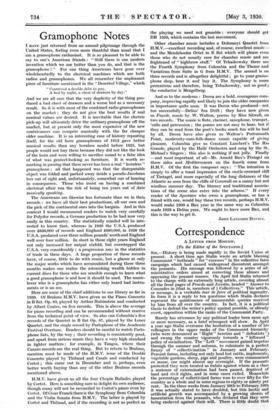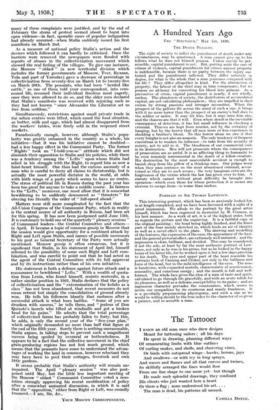Correspondence
A LETTER FROM MOSCOW.
• [To the Editor of the SPECTATOR.] Sin,—History is being made rapidly in the Soviet Union at present. A short time ago Stalin wrote an artiele blaming Communist" hcitheads " for "excesses" in the collective farni campaign which had caused widespread discontent amengst the peasants. His message was followed by a series of ad- ministrative orders aimed at correcting these abuses and appeasing the peasant masses; On April 3rd Stalin returned to the charge with auextremely long article, covering almost all the front pages of Pravda and izvestia, -headed "Answer to Comrades in (that is, members Of ) Collectives." This'article, or message, is a veritable tour de force of political ingenuity. In form it is a reply to ten questions- which Stalin declares represent the quintessence of innumerable queries received by him from all over the country. In- fact, it iS a political • thesis to defend the writer's policy against possible,- or already overt, opposition within the ranks of the Communist Party.
Rarely has utterance by any political leader been more apt or more necessary, as a brief retrospect will show. In .April a year ago Stalin overcame the hesitation of a number of his colleagues in the upper ranks of the Communist hierarchy (who were denounced as "Right" heretics and " defeatists -1 and swung the country vigorously towards a "leftward" policy of sootaliiation. The..` Left " movement'gained impetus through the summer and autumn, to Culminate in- perfect frenzy. of ." collectivization in January and ebruary. Pee.sant farms, including not only land but cattle, implements, vegetable gardens, sheep, Pigs and poultry, Were communized en masse, one might almost say overnight. If the peasants protested they were treated as kulaks against whom as a class a sentence of extermination had been passed, deprived of land and civil rights, and in some cases 'exiled. Meanwhile the percentage of tiolleetiVized farms rose to over fifty for the conntiy as a whole and in some regions to eighty or ninety per cent: In the three weeks from January 20th to February-10th it was actually stated to have doubled; but this hectic and artificial growth was accompanied by a growing chords Of lamentation from the peasants, who declared that they Were being enslaved against their will. There is little doubt that
many of these complaints were justified, and by the end of February the storm of protest seemed about to burst into open violence—in fact, sporadic cases of popular indignation had already occurred—when Stalin suddenly issued his first manifesto on March 2nd.
As a measure of national policy Stalin's action and the decrees which followed it can -hardly be criticized. Once the barriers were removed the newspapers were flooded with reports of abuses in the collectivization movement which showed the real feeling of the villages. To give one instance,
• the Moscow " oblast " (a new territorial division which includes the former governments of Moscow, Tver, Ryazan, • Tula and part of Yaroslav) gave a decrease of percentage in collectivization from seventy-five on March 1st to twenty-five on March 20th. The peasants, who had been "herded like cattle," as one of them told your correspondent, into com- munal life, resumed their individual freedom most eagerly, once they were allowed to do so, and the older men declared • that Stalin's manifesto was received with rejoicing such as they had not known "since Alexander the Liberator set us free from serfdom."
Simultaneously, restrictions against small private trade in the urban centres were lifted, which eased the food situation,
as butter, milk and eggs, which had almost disappeared from the workers' tables, were freely sold in the reopened street markets.
Paradoxically enough however, although Stalin's popu- larity was greatly enhanced in the country as a whole, his initiative—that it was his initiative cannot be doubted— had a less happy effect in the Communist Party. The former "Rights took an "I-told-you-so" attitude which did not diminish their opposition to Stalin and his policies, while there was a tendency among the " Lefts " upon whom Stalin had relied in his struggle with the Right, to regard him as now a faint-heart himself. One thus had the curious anomaly of a man who is careful to decry all claims to dictatorship, but is actually the most powerful dictator in the world, at odds with both wings of a party which seems to have no centre. The stress of political life in Russia during the past year has been too great for anyone to take a middle course. In fairness to the "Lefts," moreover, one must allow.that it is somewhat bewildering to be suddenly denounced as " thrusters " for obeying too literally the order of "full-speed ahead."
Matters were still more complicated by the fact that the All-Union Congress of the Communist Party, which in reality is the central source of all authority in Russia, had been set for this spring. It has now been postponed until June 15th. It is customary to hold one of the quarterly" plenary sessions" of Communist leaders—the Central Committee and others— in April. It became a topic of common gossip in Moscow that the session would give opportunity for a combined attack by Right and Left upon Stalin, and names of possible successors to his post as General Secretary of the Party were actually mentioned. Moscow gossip is often erroneous, but it is significant that Stalin, in his statement of April 3rd, himself referred to the possibility of some such Right and Left com- bination, and was careful to point out that he had acted as the agent of the Central Committee with its full approval and by its instructions rather than of his own initiative.
His statement is both a defence against future attack and a reassurance to bewildered "Lefts." With a wealth of quota- tion from Lenin, who found himself, mutatis mutandis, in a rather similar position in 1921, Stalin declares that the policy of collectivization and the "extermination of the Maks as a class" has not been abandoned, that recent measures do not mean retreat but simply the consolidation of ground already won. He tells his followers bluntly that rashness after a successful attack is what loses battles. "Some of you are drunken with success," he tells them, and "jealous of Don Quixote's laurels who tilted at windmills and got a broken head for his pains." He admits that the total percentage of collectivized farms has probably fallen to forty, but this, he adds, is only the second year of the " five-year plan," which originally demanded no more than half that figure at the end of the fifth year. Surely there is nothing unreasonable, Stalin argues, in taking steps to prevent such a magnificent success being spoiled by -overzeal or hotheadedness. It appears to be a fact that the collective movement in the chief grain-producing regions has not lost much ground, which means that the peasants have come to understand the advan- tages of working the land in common, however reluctant they may have been to pool their cottages, livestock and own little gardens.
It seems probable that Stalin's authority will remain un- impaired. The April plenary session" was also post- poned until May, but the little less important meeting of the Moscow " oblast " Communist Committee voted a reso- lution strongly approving his recent modification of policy after a somewhat animated discussion, in which it is said that the " opposition," either from Rightor Left, was soundly trounced.—! am, Sir, &c., Yotra Moscow ConnEsPorinENT.















































 Previous page
Previous page